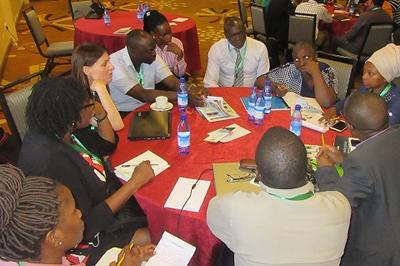Global-NAMRIP team from UK, Kenya and Malawi win £186K GCRF fund

A research partnership emerging from conversations at Global-NAMRIP’s AMR Conference in Kampala last year have been awarded funding of £186,520 from the Global Challenges Research Fund (GCRF) Collective Programme and Arts and Humanities Research Council (AH/T004207/1).
"Changing Food Systems in Kenya and Malawi and the Challenge of Tackling Antimicrobial Resistance" involves a two-year programme of work focused on the ways in which rapidly changing cultures of poultry meat consumption and agricultural systems in particular Low and Middle Income Countries (LMICs) shape antibiotic use/misuse in farming, with implications for tackling the global antimicrobial resistance (AMR) health challenge.
Led by Global-NAMRIP member Professor Alex Hughes from the University of Newcastle, the project team is comprised of Dr Abdhalah Ziraba (African Population & Health Research Center, Nairobi), Professor Alister Munthali (University of Malawi), Dr Emma Roe (University of Southampton), Dr Paul Hurley (University of Southampton) and Professor Megan Vaughan (University College London). The networking event was so successful that the team really wanted to include more partners, but the rules of the bid would not allow more than three countries in the partnership.
The first aim of the partnership is to evaluate the relationships between changing urban diets incorporating increased meat consumption, transforming food systems and the use/misuse of antibiotics in agriculture. It will do so through a focus on the poultry sectors of Kenya and Malawi, in particular the urban contexts of Nairobi and Lilongwe, given the rapid rise of poultry production and consumption in both places and the increased and weakly regulated use of antibiotics in production. Kenya and Malawi are a Lower Middle Income Country and a Least Developed Country, respectively, on a continent predicted to see the highest mortality rate from AMR by 2050.
A workshop “Changing Poultry Production Systems and the Challenge of Tackling Antimicrobial Resistance: Insights from Kenya and Malawi” is planned for 12th May 2020 at Newcastle University, to share preliminary research from the project.
The project team also plan to generate culturally and geographically sensitive approaches to antibiotic reduction and stewardship initiatives in these contexts, in ways that improve implementation of their governments' AMR National Action Plans. The premise of the research is that policies and targets for the reduction of antibiotic misuse in agriculture are most likely to be effective if their implementation is responsive to the specific pressures, constraints and opportunities experienced by farmers in the context of the particular food systems in which they are embedded.
I am delighted that the project has grown out of the Global-NAMRIP meeting in Kampala, where we funded visitors from 7 countries to meet and plan exciting new research to combat AMR and help prevent infections. Well done to this team, and we look forward to seeing the plans from all the other new teams we helped bring together in Kampala. We are grateful to GCRF for funds supporting that meeting.